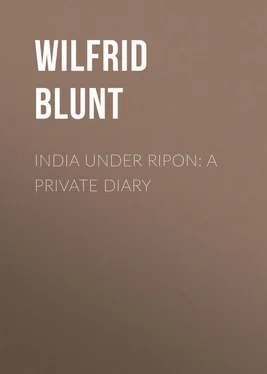Wilfrid Blunt - India Under Ripon - A Private Diary
Здесь есть возможность читать онлайн «Wilfrid Blunt - India Under Ripon - A Private Diary» — ознакомительный отрывок электронной книги совершенно бесплатно, а после прочтения отрывка купить полную версию. В некоторых случаях можно слушать аудио, скачать через торрент в формате fb2 и присутствует краткое содержание. Жанр: foreign_antique, foreign_prose, на английском языке. Описание произведения, (предисловие) а так же отзывы посетителей доступны на портале библиотеки ЛибКат.
- Название:India Under Ripon: A Private Diary
- Автор:
- Жанр:
- Год:неизвестен
- ISBN:нет данных
- Рейтинг книги:4 / 5. Голосов: 1
-
Избранное:Добавить в избранное
- Отзывы:
-
Ваша оценка:
- 80
- 1
- 2
- 3
- 4
- 5
India Under Ripon: A Private Diary: краткое содержание, описание и аннотация
Предлагаем к чтению аннотацию, описание, краткое содержание или предисловие (зависит от того, что написал сам автор книги «India Under Ripon: A Private Diary»). Если вы не нашли необходимую информацию о книге — напишите в комментариях, мы постараемся отыскать её.
India Under Ripon: A Private Diary — читать онлайн ознакомительный отрывок
Ниже представлен текст книги, разбитый по страницам. Система сохранения места последней прочитанной страницы, позволяет с удобством читать онлайн бесплатно книгу «India Under Ripon: A Private Diary», без необходимости каждый раз заново искать на чём Вы остановились. Поставьте закладку, и сможете в любой момент перейти на страницу, на которой закончили чтение.
Интервал:
Закладка:
With this preliminary word I leave my diary to tell its own story.
CHAPTER II
CEYLON
“Left home by the 10 o’clock train, and spent the day in London. A letter had come from Eddy Hamilton by the morning’s post asking to see me before I went abroad, and I went to Downing Street at one o’clock. Mr. Gladstone is away yachting, and Eddy is acting Prime Minister, and a very great man. I had not been to Downing Street since last year – just upon a year ago – when I went to ask for Arabi’s life. Eddy was extremely amiable this time, and asked me what I was going to do in the East. I told him my plans exactly – that I was going first to Egypt, and should call on Baring and, if I found him favourably disposed, should propose to him a restoration of the National Party, but if he would not listen I should go on to Ceylon and India; that I could not do anything in Egypt without Baring’s countenance, for the people would not dare to come to speak to me; but, if Baring would help, I thought I could get the Nationalist leaders elected at the elections – all depended on the action of our officials. Also as to India – that I had no intention of exciting to rebellion; that I should go first to Lord Ripon, then to Lyall, and afterwards to the provinces; that the subjects I wished principally to study were the financial condition of the country, that is to say, to find out whether our administration was really ruining India, and to ascertain the views of the natives with regard to Home Rule. Of both these plans Eddy seemed to approve, said that Baring would be sure to wish to see me, and listen to all I had to say, and, though he did not commit himself to anything very definite about the rest, did not disapprove. With regard to India, he said he would write to Primrose, Lord Ripon’s private secretary, to show me all attention; so on the whole I am highly satisfied with my visit. I had some talk with Eddy about Randolph Churchill. He said that my connection with him in Egyptian affairs did me harm, but I don’t believe that, and I look upon Churchill as quite as serious a politician as the rest with whom I have had to deal. On Egypt I think he is sincere, because he has an American wife, and the Americans have always sympathized with freedom there. I believe, too, that he is at a turning point in his character, and means to have done with mere random fighting, and we both agreed that he has a career before him. For my own part I like Churchill. He does not affect any high principles, but he acts squarely.”
The next day I left with my wife for Paris, where our principal interest was to see the small group of Egyptian exiles congregated there.
“ 13th Sept. – We arrived by the night train at Paris, and alighted at the Hôtel S. Romain, a quiet place where we can see our friends. Presently Sabunji came in with Sheykh Jemal-ed-Din. 1 1 A history of Seyyid Jemal-ed-Din Afghani, the well-known leader of Liberal Panislamism will be found in my “Secret History of the Occupation of Egypt,” 1907. Mr. Sabunji had been employed by me in Egypt, and accompanied me there on the present occasion as my secretary as far as Ceylon.
When I saw the Sheykh in London in the spring, he wore his Sheykh’s dress. Now he has clothes of the Stambouli cut, which, however, sit not badly on him. He has learned a few words of French, but is otherwise unchanged. Our talk was of India, and of the possibility of my being able to get the real confidence of the Moslems there. He said that my being an Englishman would make this very difficult, for all who had any position to lose were in terror of the Government, which had its spies everywhere. He himself had been kept almost a prisoner in his house and had left India through fear of worse. Any Sheykh who gained notoriety in India was tracked and bullied, and if he persisted in an independent course he was sent on some charge or other to the Andaman Islands. People, he said, would not understand that I wished them well, and would be too prudent to talk. The poorer people might, not the Sheykhs or the Princes. He thought Hyderabad would be my best point, as there were refugees there from every province of India, and they were less afraid of the English Government. He said he would write me some private letters to explain my position, and to the editors of some Mohammedan newspapers. I told him what the political position was, and how necessary it seemed to me that the Moslems should show that they joined the Hindus in supporting the Ripon policy. All depended on the Indians showing a united front. He said they might have courage, if it could be proved to them that there were people in England who sympathized with them, but they only saw the officials, who never smiled when they spoke to them . I asked him about the language I should most prudently hold regarding the Sultan, and he advised me to say nothing against the Sultan in India, or about an Arabian Caliphate; it had been spread about that the English were going to set up a sham Caliphate in Arabia, under a child, whom they would use to make themselves masters of the holy places; the Sultan’s name was now venerated in India as it had not formerly been.
“ 14th Sept. – Jemal-ed-Din and Sanua and Sabunji came to breakfast, and we stayed talking all day. The Sheykh brought with him letters which he had written to the Nawab Abd-el-Latif of Calcutta, and the Nawab Rasul Yar Khan of Hyderabad, both of which I hope may be of great value. He told us some interesting particulars as to his own people and family, repudiates the idea of the Afghans being a Semitic people, says on the contrary that they are Aryans, like the inhabitants of Northern India, but his own family is Arabian, and they have always preserved in it the tradition of the Arabic language. He also discoursed on history. I read them my poem ‘The Wind and the Whirlwind,’ which Sabunji in part translated to the Sheykh. He said that, if he had been told there was in the world an Englishman who really sympathized with the misfortunes of India, he would not have believed it. Sanua exhorted me to have the poem translated into good Arabic verse by El-Rakkam, a pupil of Abdu’s. I also went through with him a programme I have drawn up for the restoration of the National Party in Egypt, and talked over with the Sheykh a scheme of restoring the Azhar as a real university for all Islam, and he explained how it had been in old days.”
The same evening we took train to Marseilles, and went on by Messageries steamer to Egypt, where we spent a fortnight. Our stay there was productive only of disappointment as far as the political situation went. I found Sir Evelyn Baring, when I called on him, willing enough to talk things over with me, but half-an-hour’s conversation was sufficient to convince me that, whatever Mr. Gladstone might dream or pretend to dream about restoring the National Party and recalling the exiles, nothing was further from Sir Evelyn’s mind. He had no intention whatever but that of supporting the Khedive and the party of reaction. We consequently turned our steps once more eastwards, and embarked at Suez on the 9th of October, in the British India ship “Ghoorkha,” having so far altered our original plan of travel as to include in it Ceylon, where we desired to visit our exiled Egyptian friends, Arabi Pasha and his four companions. We intended to stay with them a few days only and pass on thence into Southern India.
We were delayed, however, longer than we thought. I had hardly got on board when I began to develop a malarious fever, which, before the end of the voyage had become serious. The “Ghoorkha” was a detestable conveyance, overcrowded, swarming with vermin, and miserably provided. There was no doctor on board, nor any means of comfort for a sick person. Driven out of my cabin by the heat and its discomforts, I was laid on a table in the saloon, and there passed my days in extreme wretchedness but nursed by my wife and her maid Cowie, who was devoted and admirable on such occasions. Our fellow passengers were a rough set of Colonial English and planters from India, Assam and Burmah. With these we had a constant battle for existence. In the early days of the voyage I still tried to write my journal, and I give such extracts from it as have anything of public interest.
Читать дальшеИнтервал:
Закладка:
Похожие книги на «India Under Ripon: A Private Diary»
Представляем Вашему вниманию похожие книги на «India Under Ripon: A Private Diary» списком для выбора. Мы отобрали схожую по названию и смыслу литературу в надежде предоставить читателям больше вариантов отыскать новые, интересные, ещё непрочитанные произведения.
Обсуждение, отзывы о книге «India Under Ripon: A Private Diary» и просто собственные мнения читателей. Оставьте ваши комментарии, напишите, что Вы думаете о произведении, его смысле или главных героях. Укажите что конкретно понравилось, а что нет, и почему Вы так считаете.












